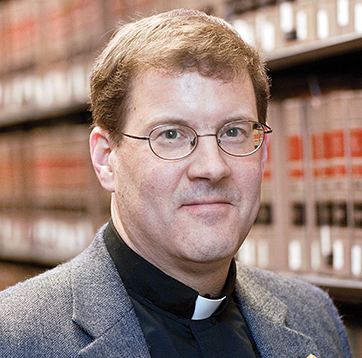
By
The initiative to renew Boston College’s undergraduate core curriculum enters a new phase this academic year, with the goal of creating four to six pilot courses for 2015-16.
But the core renewal effort’s leaders also see an opportunity in the months ahead for a wider reflection and discussion on the core’s distinctive place in BC education – and the distinctive role of faculty who teach in it.
These and other core-related topics will be on the agenda when the Core Foundations Task Force holds a town meeting-style event on Oct. 15 at 4 p.m. in Fulton 511.
“It’s important for us, as a community, to be re-energized as the process goes forward,” said College and Graduate School of Arts and Sciences Interim Dean Gregory Kalscheur, SJ, who chairs the task force. “We need the engagement of our colleagues to succeed in renewing the core, and in affirming its importance to Boston College.”
The effort began in the fall of 2012 when the Core Renewal Committee met with groups of faculty, administrators, staff, students and other stakeholders in the University community to address concerns and hear views regarding the core curriculum, last revised in 1991. By the following spring, the committee had formulated a proposal with an emphasis on intellectual engagement with enduring questions, interdisciplinary approaches to complex problems, student formation and personal discernment. The proposal also suggests roles for the divisions of Student Affairs and University Mission and Ministry in the core experience.
After the CRC submitted the proposal to University President William P. Leahy, SJ, he established the Core Foundations Task Force this past spring to continue the work.
One of the most important milestones in the core renewal process, said Fr. Kalscheur, has been the creation of a vision statement for the core, titled “The Vision Animating the Boston College Core Curriculum.” [It is available for viewing at http://bit.ly/ZgPWXk]
“This document lays out, in very concrete and straightforward terms, the core’s place at BC but also in the context of the Jesuit educational tradition,” he explained. “Then it discusses the core’s relevance to intellectual and spiritual formation today, inviting students and faculty ‘to see how the various disciplines, with all their specificity, differentiation, and limitations, might work together to construct an integrated understanding of reality.’
“Of particular interest to faculty is the section that talks about the ‘distinctive role’ they play through teaching in the core: It’s not enough to teach students a body of material; faculty must be attentive to the context of their students’ lives. It is our hope that faculty will help students see why studying this material deepens their understanding of what it is to be a person, and who they will become as they engage this material. Faculty are encouraged to help students see how the material will contribute to better understanding the world in its wholeness.”
The document notes that faculty teaching in the core should present themselves as models, Fr. Kalscheur added, and show how one’s educational and vocational interests are guideposts to becoming “citizens, leaders, and human beings of depth of thought, creative imagination, and compassion.”
This vision statement should be a resource for faculty members in developing proposals for pilot courses that will debut next academic year, said Fr. Kalscheur. These courses would be part of two sequences that involve the multidisciplinary study of fundamental questions and global challenges, Enduring Questions and Complex Problems.
The task force, meanwhile, will create a plan for assessing pilot courses to ensure they meet the criteria for learning outcomes in the core curriculum. These include understanding and utilizing major ideas and methods of inquiry in scholarly disciplines to address complex contemporary problems, for example, or discussing enduring questions and issues that are fundamental to human inquiry.
In addition, the task force will offer workshops and other programming to assist faculty on various aspects of the core, such as pedagogy in team-taught courses.
“We want a dialogue with, and among, faculty about the ways in which they can engage students,” said Fr. Kalscheur. “What’s important about Jesuit education goes beyond the core curriculum, but we want the core to reflect that Jesuit distinctiveness, and it’s vital that our faculty understand – and are inspired by – their central role in accomplishing this.”



